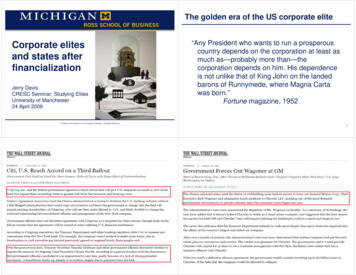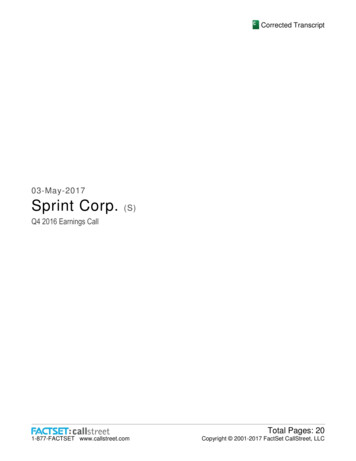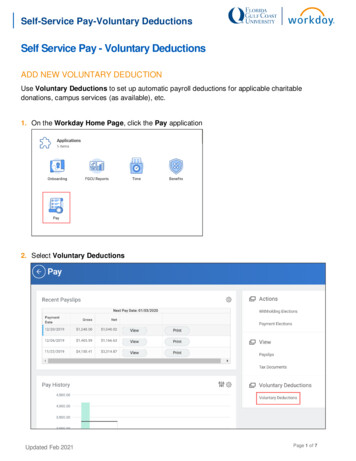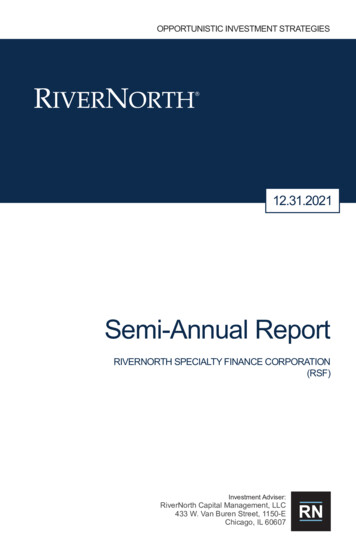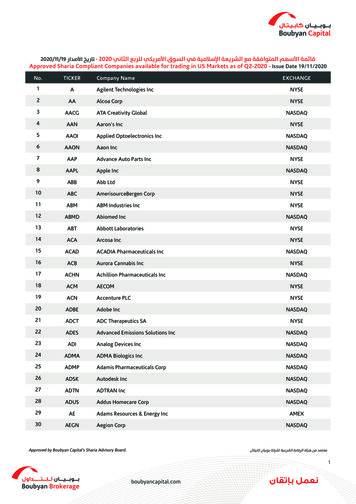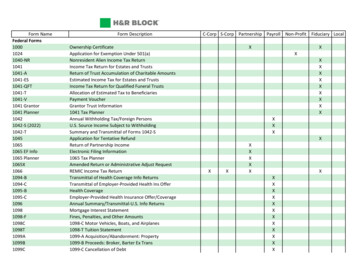
Transcription
S-Corp Benefits & Deductions1
DisclaimerThis material & presentation content is for informational and educationalpurposes only.This material and presentation content is designed to provide generalinformation regarding the subject matter covered. It is not intended to serveas legal, tax, or other financial advice related to individual situations.Because each individual’s legal, tax, and financial situation is different,specific advice should be tailored to the particular circumstances.For this reason, you are advised to consult with your own attorney,accountant, tax preparer, and/or other advisor regarding your specificsituation or your client’s specific situation. The information and allaccompanying material are for your use and convenience only.We, at BORISMTAX Inc., and its third party affiliates and presenters, havetaken reasonable precautions in the preparation of this material and believethat the information presented in this material is accurate as of the date itwas written. However, we will assume no responsibility for any errors oromissions. We specifically disclaim any liability resulting from the use orapplication of the information contained in this publication.To ensure compliance with requirements imposed by the IRS, we inform youthat any US federal tax advice contained in this communication (includingany attachments) is not intended or written to be used, and it cannot be usedfor the purpose of (i) avoiding penalties under the Internal Revenue Code or(ii) promoting, marketing, or recommending to another party any transactionor matter addressed herein. Always seek advice based on your particularcircumstances from an independent advisor.S-Corp Benefits & Deductions2
Table of ContentsIntroductionAbout the AuthorTax Planning vs. Tax Preparation57Basics of S-CorpWhat is S-CorpS-Corp TaxationMaking S-Corp ElectionWhy S-Corp891011Tax Reform & S-CorpSection 199A DeductionDoctors, Lawyers, Athletes, Traders & Others1214S-Corp Tax StrategiesOwner’s Salary StrategyHealth Care StrategiesSolo OwnerOwner & EmployeesHealth Insurance Tax CreditRetirement StrategiesSEP IRASolo 401(k)Simple IRA401(k) & Profit SharingS-Corp Benefits & Deductions15161819202122233
Table of ContentsS-Corp Tax Strategies (continued )Hiring Family MembersHiring SpouseHiring ChildrenAugusta StrategyMeal CategoriesPrepaid ExpensesAccountable PlanAccountable Plan ExplainedAdmin Home OfficePersonal Vehicle Tax Deduction2627282930323335Bonus Material100% Write Off Your Beach HomeSelf Rental StrategyCost Remediation363739Disclaimer40S-Corp Benefits & Deductions4
Boris Musheyev, CPA, CTCEver since my first year in college, I had an unexplainable burning desirein me to learn as much as I can about taxation. I wanted to do taxes andnothing else. After graduating college, I was sucked into the world ofTraditional Accounting.The same world that most tax accountants are in.Grinding through tax season, preparing and filling almost 500 tax returnsper season.That is an insane number.There was no value that I was providing my clients by simply preparingand filing their taxes.Let me rephrase, almost 500 tax returns in 3.5 months, I was burned outand my clients got no value out of it, because I was just making it throughthe deadline of filing taxes.S-Corp Benefits & Deductions5
About the Author (continued )I came across so many businesses that were insanely overpaying intaxes and there was nothing that I could do for them. Why? Because I wasjust a tax preparer and not a Tax Planner. It was all REACTIVE ratherthan PROACTIVE. That is why most tax accountants and CPA’s are notspecializing in Tax Planning, rather they are stuck in the work of taxpreparation.After venturing out on my own, I decided to make it my duty and obligation tofocus on delivering only value to my clients and helping them save money ontaxes.Most importantly educating business owners and entrepreneurs on theways they can minimize their tax liability.And no, not JUST by tax preparation.I’ve spent tens of thousands of dollars and years in trenches learning themost effective methods to LEGALLY reduce taxes.I have spoken with, studied, worked and learned from one of the best taxexperts in the country. I was also awarded the “Certified Tax Coach”designation by American Institute of Certified Tax Planners and I am just oneof 700 Tax Professionals in the country that completed intensive program oncourt tested, IRS approved Tax Strategies.It is my hope that you will find the strategies in this book helpful, useful andmost important tax effective!S-Corp Benefits & Deductions6
Why Tax PlanningTax Planning vs. Tax PreparationBefore we jump into the benefits and deduction of an S-Corp, I’d like tointroduce you to the world of tax planning.Tax Planning is not a new concept but it is practically not utilized by smallbusinesses. You see, everyone thinks that Tax Planning is for big players,multi-millionaires, big fish as they call them. That is a huge misconception. Ialways say, “If you are profitable in your business, there is money to besaved on taxes. Simple”.Tax Planning is not Tax Preparation and it will NOT work if it is done atthe end of the year or at the time of filing your taxes. Tax Planning meansbeing PROACTIVE. The reason why a lot of people are not able to takeadvantage of so many and again so many tax strategies is because theyfail to be proactive about it. They, most often than not, wait until the endof the year only to be slapped with a tax bill. They are at the mercy of theirtax preparer who very often answers the following:"There is nothing else that can be done, you made too much money and thatis a good problem to have."That is simply not true. I know this because I work with business owners inthis situation and I help them significantly reduce their taxes via proper taxplanning and using little known LEGAL tax strategies. My clients are able tosave tens of thousands of dollars on taxes, and create millions of dollarsin TAX FREE income. Yes it is true and it is possible.So, let's get right into S-Corp Benefits & Deductions.S-Corp Benefits & Deductions7
Basics of S-CorpWhat is S-CorpS-Corp is a separate legal entity distinct from its owners. It is widely used bysmall business owners to save money on taxes but also provides a liabilityprotection for it’s shareholders.S-Corps have some limitations:1.2.3.4.Can only have one class of stock.Not more than 100 shareholdersBe a domestic corporationThe shareholder must be either US citizen or legal residents of theUnited StatesS-Corp Benefits & Deductions8
Basics of S-CorpS-Corp TaxationS-Corp must file a separate tax income tax return on form 1120S but it doesNOT pay its own taxes. Instead, here is a simple breakdown: All net profit from an S-Corp is passed-through to it’s shareholders viaK-1 The net profit reported on a K-1 for each shareholder is then reportedon the shareholder's personal tax return, after which: Shareholder pays his/her share of taxes depending on his/her taxbracket on the income received from the S-Corp.Important S-Corp is ALWAYS required to file its taxes even if there was no activityduring the year. Penalty for not filing a timely tax return is 195 pershareholder up to 12 months. S-Corp tax return (Form 1120S) must be filed by March 15 of eachyear. When the 15 falls on a weekend, the return is due the followingbusiness day.S-Corp Benefits & Deductions9
Basics of S-CorpMaking S-Corp ElectionIn order for you to make an S-corp election you must first either: Form a domestic US-Corp or organize a Limited Liability Company (LLC).After which you must make an S-corp election by filing form 2553 with theIRS within 75 days of your company’s formation. You may also need to file aseparate S-Corp election with your state. Most states do not require aseparate election.ImportantIf you file for an S-Corp election after 75 days after your company’sformation, the IRS will still grant you late election.S-Corp Benefits & Deductions10
Basics of S-CorpWhy S-CorpLet's take a step back and talk about why most business owners choose anS corp tax status?When a business files taxes as a sole proprietor or as a partnership, it paysself-employment tax of 15.3% (Social Security & Medicare) on all of its netprofit.For example: Your net profit from your business is 130K. Your selfemployment tax on 130k net profit is 19,890.By electing to be taxed as an S-Corp, a business does not pay 15.3%self-employment tax on the net profit. Instead, the net profit from an S corp ispassed-through to its shareholders. But each shareholder is required to payhim/her a salary. Only the salary of the shareholder is subject toself-employed taxes.For example: Your net profit from your business is 130K. You elect to betaxed as an S-Corp and your salary is 70,000. Your self employment tax isnow 10,710 saving you an estimate of 9,180 ( 19,890 - 10,710).ImportantA salary for an S-Corp owner must be considered reasonable. See sectionon “Owner’s Salary Strategy”.S-Corp Benefits & Deductions11
Tax Reform & S-Corp EntitySection 199A DeductionTax Cuts and Jobs Act made significant changes which had a huge impacton business and personal income taxes. As you are probably aware, there isa new flat corporate tax rate of 21% for all corporations, but this applies toC-corporations ONLY.S-Corp is considered a pass-through entity. As mentioned earlier, all netprofit from an S-Corp is passed-through to its owner. With the passing of thenew tax law, an owner of a pass-through entity gets a 20% deduction onhis/her personal income tax return. This deduction is referred to as aQualified Business Income Deduction (QBI) or a Section 199a Deduction.20% deduction is a lesser of Your taxable income Your Qualified Business IncomeExample: Your qualified business income from your S-corp is 100k and yourtaxable income is 80k. Your 20% QBI deduction is 16k (80k x 20%).In general, if your taxable income for 2019 is 210,700 (single filer), including phaseouts 421,400 (joint filers) including phaseoutsThen you may NOT take this deduction!But, if you pay wages from your business to either employees or yourself,then you can take the deduction even if your income is above thesethresholds.S-Corp Benefits & Deductions12
Tax Reform & S-Corp EntitySection 199A Deduction (continued )Plan AheadTherefore, if you know in advance that your taxable income will be over theabove thresholds, then it is super important for you to plan ahead whenconsidering the QBI deduction.Things to consider: Your qualified business income Your taxable income How much wages are you paying to your employees, if any How much will your reasonable compensation beImportantThis is a FREE deduction given to you by the IRS and if you don't planaccordingly, if you don't speak to your accountant about this or if you don'task your accountant questions about this, you will lose big time.S-Corp Benefits & Deductions13
Tax Reform & S-Corp EntityDoctors, Lawyers, Athletes, Traders & OthersIf you are an owner of what the law calls a “specified service trade orbusiness” and you make “too much money”, over the threshold amounts 210,700 (single filer), including phaseouts 421,400 (joint filers) including phaseoutsYou will not get the 20% QBI tax deduction. OUCH!!!This group of owners include owners in the field of health, law, consulting, athletics, financial services, andbrokerage services where the principal asset of such business is the reputation Or skill ofone or more of its employees or owners That involves the performance of services that consist of investing andInvestment management trading, dealing in securities, partnershipinterest, or commodities. For this purpose, security and commodityhave the meanings provided in the rules for the mark-to-marketaccounting method for dealers in securities ( Sections 475(c)(2) and475(e)(2), respectively.Engineers and Architects - are not considered specified trade of businessfor the purposes of section 199A deduction.Tax StrategyIf your taxable income is above the threshold amounts, then considerplanning ahead and reducing your taxable income below the thresholdamounts. This would include maximizing your retirement account, prepayingcertain expenses (see section on prepaid expenses) and etc.S-Corp Benefits & Deductions14
S-Corp Tax StrategiesOwner’s Salary StrategyAs an owner of an S Corp and also it's officer you are required by IRS law topay yourself a reasonable compensation. All net profit from an S Corp flowsthrough to its shareholders, which means all of that profit is not subject toself-employment tax (Social Security & Medicare).What does reasonable compensation mean? Ironically, the IRS doesn't getinto details of what reasonable compensation means but it does say that areasonable compensation is any salary that you would pay to a person doingyour job in your position or in some cases not even. In many instances Ihave seen that owners of an S Corp overpay themselves a salary whichresults in overpayment of self-employment taxes.By establishing a reasonable salary for yourself as an owner of your S-Corpyou will significantly save money on self employment taxes which couldmean thousands of dollars on taxes. Most business owners are “wearingmany hats” in the business: sales, admin, bookkeeping, invoicing and thenbeing an owner. All of these categories combined together, will reduce yourtaxes significantly.Tax StrategyAt my firm we use a third party company that specializes in assessingreasonable compensation for S-Corp owners depending on task categories,demographics and georgary. Think of it this way, the salary of a New YorkS-Corp owner will be much higher than Alabama S-Corp Owner.If you’d like an analysis done on your salary, please email us ataccounting@borismtax.comS-Corp Benefits & Deductions15
S-Corp Tax StrategiesHealth Care Strategies - Solo OwnerWarningIf you are more than 2% shareholder of your S-Corp then you are notallowed to receive fringe benefits from your S Corp. Health insurancepaid by your S-Corp for you would be considered a fringe benefit therefore itmay not be deducted from your taxes. Whether you pay for it individuallyor through a group plan.However, IRS still allows more than 2% shareholders of an S-corp to deducthealth insurance from by following certain rules and criteria:1.2.3.Make the S-Corp pay for your health insurance either directly to yourinsurance company or through remboursement to youHave the S-Corp include your health insurance reimbursements orpayments as part of your wages on your W-2Now you can deduct the cost of health insurance premiums as aself-employed health insurance deduction on your personal income taxreturn.I am warning you If you are deducting health insurance premiums foryourself as some more than 2% shareholder of your S-Corp and you're notdoing it through your W-2 then you may not take this deduction. It willraise a red flag and it will be added back to your income because it wasnever properly added to your wages.S-Corp Benefits & Deductions16
S-Corp Tax StrategiesHealth Care Strategies - Solo Owner (continued )Tax StrategyNow that we spoke about how to properly deduct your health insurancepremiums, let's talk about how you can further save money on taxesusing this strategy. Let’s incorporate your health insurance premiums intoyour reasonable compensation.Let's say for argument's sake your reasonable compensation should be 100,000 and your family health insurance premiums are 20,000 per year.The IRS allows you to include 20,000 premiums as part of your 100,000 salary.Nope, not an addition to the salary but as part of the salary! The reasonyou would want to include your 20k premium as part of your compensation isbecause 20,000 of your premiums will not be subject to self-employmenttax.Important Make sure that the health insurance premiums for you as an owner ofan S-Corp are included as part of your wages on your W-2. Do not increase your reasonable salary by insurance premiums butinstead include it as part of your wages to further save money onself employment taxes.S-Corp Benefits & Deductions17
S-Corp Tax StrategiesHealth Care Strategies - Owner & EmployeesAs a small employer you do not have to provide any health insurancebenefits to your employees. You don't have such a requirement. Smallemployer is considered someone with less than 50 full-time employees.One of the biggest mistakes that I've seen an S-Corp owners do is reimbursetheir employees for individually purchased health insurance, withoutfollowing the rules.If you want to provide health insurance benefits to your employees andreimburse them for their cost you may still do so but you first lthReimbursement Arrangement (QSEHRA). Using QSEHRA, you mayreimburse your employees for their health insurance premiums up to acertain amount. For 2019, for single individuals you may reimburse up to 5,150 and for married individuals you may reimburse up to 10,450.SolutionIf you want to implement QSEHRA you must give a notice to your employeesbefore you can actually implement it and take it as a tax deduction. Torequest a sample of QSEHRA notice please reach out toaccounting@borismtax.comS-Corp Benefits & Deductions18
S-Corp Tax StrategiesHealth Care Strategies - Health Insurance Tax CreditAs an employer you may qualify to actually receive a tax credit for paying foryour employees health insurance premiums. Tax credit meansdollar-for-dollar deduction from your tax liability. It's a great strategy, butyou must be eligible:1.2.3.You employed less than 25 full-time employees during the yearpaid annual wages less than 54,000 or less per employee (2018)You paid for health insurance premiums purchased through smallbusiness health options program (SHOP) Marketplace.ImportantIf you qualify for this credit, make sure that your accountant knows about thiscredit and property captures this tax credit on your personal income taxreturn since S Corp is a flow through entity.S-Corp Benefits & Deductions19
S-Corp Tax StrategiesRetirement Strategies - SEP IRA Owner ONLYThe most attractive retirement account for a small business owner includingan S-Corp with no employees is SEP IRA. SEP IRA is relatively easy to setup and administer and it's very cheap. Contributions to SEP IRA a limitedto 25% of your W-2 wages. For instance if you're reasonable compensationthat is paid to you as an S-Corp shareholder on your W-2 is 100,000 thenyour S-Corp may contribute 25,000 into your SEP IRA account.The drawback of using the SEP IRA is the limitation on deduction. If youwant to put away more money into your SEP and write it off your taxes thanyou would have to increase your W-2 wages. By increasing your W-2wages you will also end up overpaying in self-employment taxes. This willdefeat the purposeImportantPlease note that the overall contribution to a SEP IRA may not exceed 57,000 (2020). This could still be a good retirement account for you butonly if you're not planning to put away as much. As in our previousexample of a reasonable compensation 100,000 your contributionlimitation is 25,000.S-Corp Benefits & Deductions20
S-Corp Tax StrategiesRetirement Strategies - Solo 401(k) Owner ONLYA better alternative to the SEP IRA for a solo owner of an S corp is a Solo401k. Solo 401K is too, relatively easy to set up, manage and it’s cheap toadminister. Actually in many cases it is free.Contributions to solo 401K are far greater than of a SEP IRA by having thesame salary. With a Solo 401(k), you can defer up to 19,500 (2020) ofyour own salary. After which, your Scorp can contribute 25% more into yourplan and take it as a deduction. If you are over the age of 50, you cancontribute 6,500 more (2020) which is also referred to catch upcontributions.All in all, total contributions may not exceed 57,000 for 2020 and and 63,500 if you are age 50 and older.Using the same example as above (from SEP IRA) if your reasonablecompensation is 100,000, you may contribute 44,500 and additional 6,500 if you are age 50 and older.S-Corp Benefits & Deductions21
S-Corp Tax StrategiesRetirement Strategies - SIMPLE IRA Owner &EmployeesIf you are not a big fan of retirement and not really looking to contribute toyour own retirement as much as you want to offer this benefit to youremployees, then consider a Simple IRA.A Simple qualified retirement plan allows eligible employees of a company tosave and invest for their own retirement on a tax deferred basis. As anowner of your S-Corp you are also considered an employee of your ownbusiness. Therefore, you are eligible to contribute to Simple IRA, andmax out on it if you choose to do so.The contribution limits for 2019 is 13,000 plus additional 3,000 if youare over the age of 50. By establishing a SIMPLE IRA, you are alsorequired to make one of the two contributions:1. A matching contribution of 3% or2.A non elective contribution of 2% to all eligible employeesLike I said if you are not a big fan of retirement contributions for yourself,then having this type of retirement account is cost effective and yet keepemployees happy.S-Corp Benefits & Deductions22
S-Corp Tax StrategiesRetirement Strategies - 401(k) & Profit SharingOwner & EmployeesAh, this is where it gets juicy if you really want to maximize retirementcontributions even keeping the costs down by having employees.Let’s start with basics:When you have employees you should set up a 401k plan with a safe harborprovision. Safe harbor means that you can match your employee no morethan a certain amount based on their contributions. For example, you canchoose to match your employee’s contributions up to 3% of his/her salaryevery year. This can be either elective or non elective. Remember, You andyour employees have an option to defer up to 19,500 (2020) dollars of yourown salary into a 401K plan.Elective - you will only match your employee if employee chooses tocontributeNon Elective - you will contribute to your employees regardless if employeecontributesExample:You offer an elective 401(k) plan, 3% match to your employees with safeharbor provisions.Employee, Bob, gets paid 80,000 a year from your S-Corp. Bob defers 6,000 of his salary into his 401K plan. You as an employer must match up to3% of his 80k salary (80,000 x 3% match).Your contributions into his plan will be 2,400 (80,000 x 3%)S-Corp Benefits & Deductions23
S-Corp Tax StrategiesRetirement Strategies - 401(k) & Profit Sharing(continued.)Tax StrategyLet's say your reasonable compensation as an S corp owner is 90,000. Youmade the first 19,500 of your own salary into a 401k Plus at 3% which is 2,700. Your total contribution and at an adduction for yourself is 22,200 .If you want to maximize your contributions and write off 56,000 then youcan do what it's called a profit sharing plan. The key here is, PROFITSHARING. Your 401k should be set up in a way to allow safe harborprovision with a certain match PLUS the profit sharing component to it.Profit sharing won't always work in your benefit if you have employees whoare either the same age as you, older than you, worked for you for along time, full time or a highly compensated.It really depends.But a profit sharing option could be a great way to be able to contribute a lotmore to yourself while taking a big tax deduction. This may also allowlower contribution limits to your employees. I emphasize it all depends.What you need to do at this point is contact your financial advisor and askhim or her to run calculations for you. Usually these calculations are donewith the help of a third-party administrator. Your financial advisor shouldknow this.S-Corp Benefits & Deductions24
S-Corp Tax StrategiesRetirement Strategies - 401(k) & Profit Sharing(continued.)You are going to need to provide a payroll census to your financial advisorand they will be able to run calculations and let you know if profit sharingwhat makes sense for you and what is it going to cost you intocontributing to your employees or not. They should also be able to tell youwhether you need to contribute more to your employees or not.In my practice doing tax planning for my clients I have utilized this strategynumerous times. And it worked! Simply because my clients didn't haveemployees who are either highly compensated or are older than him or her!ImportantContact your financial advisor and speak to him/her about these options ifyou have employees and you have a 401K plan.S-Corp Benefits & Deductions25
Hiring Family MembersHiring SpouseIf you are hiring your spouse in your S-Corp, you should consider a fewthings first and foremost: what are you paying your spouse? In many casesowners extremely over pay their spouse for the work that they'reperforming. Now you might argue that you want to maximize retirement.Maybe, maybe not.You can still maximize your spouse's retirement and get a big tax write-offeven with a lower salary.Overpaying your spouse's salary will cost you in over payments of FICAtaxes. FICA taxes are your payroll tax which are social security & medicaretaxes. How do you determine your spouse's salary? Well think about it, ifyou are to hire someone else in his/her stead, how much would you pay thatperson? All you have to do is pay your spouse a reasonable compensation.A compensation you would pay to someone else doing the same job. Youdon't need to pay your spouse over 100,000 of salary, especially if yourspouse has a day time job.Besides lowering your spouse's salary to a reasonable amount, you mayalso maximize his/her retirement account and get a double write off. Awrite off for yourself, and write off for your spouse. Big time!S-Corp Benefits & Deductions26
Hiring Family MembersHiring ChildrenYou can also hire your children to work for you in your S-Corp. Childreneither under the age of 18 or over the age of 18, it doesn't really matter. Thereason you would want to consider this option is because yourchildren are in the lower bracket than you are.Any individual in the United States can earn up to 12,000 of income andnot pay federal income tax on those earnings. If you're hiring a child thatis under the age of 18 and that child doesn't have any other job and youpay this child up to 12,000 you can take that as a write off. Your childdoesn't have to pay taxes on 12,000 of income earned from your S-Corp.Small Drawback: By paying your child you will incur payroll taxes ofSocial Security and Medicare, 15.3%. Remember, to use this strategy ithas to make sense. If you are in a 40% tax bracket between federal andstate, by hiring your child you will pay 15.3% tax on 12,000 salary per childbut you will still save 25% on taxes (40% - 15%).Using our example that's 3,000 saved on taxes per child or 6,000 fortwo children.If you hire your child that is under the age of 18, most likely this childdoesn't have any other job besides the ones the one you hired him so usethis strategy to add an additional 12k in deduction to yourself.ImportantWith an S-Corp, it does not matter if your child is under or over the age of18. You will pay FICA taxes on your child’s payroll, but if you are in a hightax bracket, then there is still an overall tax benefit.S-Corp Benefits & Deductions27
S-Corp Tax StrategiesAugusta StrategyThe IRS allows a business owner to rent their primary residence or avacation home to their business for up to 14 non-consecutive days eachyear. The residence can be located anywhere in the United States and theincome is excluded from taxable income for the residence owner / businessowner.As an S-Corp owner you can rent your home to your business for boardmeetings are the strategy meetings Employees. You can basically pay rentto yourself for renting your own home from the business. This will be a taxdeduction to your business and you will not have taxes on this “rental”income.The rental is established with a lease agreement between the business andresidence owner, with pricing supported by researching and documentingcomparable space for a similar event.S-Corp Benefits & Deductions28
S-Corp Tax StrategiesMeal Categories50 Percent Deductions: Lunch with customer, client or employee associated with a businessdiscussion Taxes and tips relating to a meal or entertainment activity Room rental for a dinner or cocktail party (assuming the event met thebusiness relation test)100 Percent Deductions: Transportation costs to and from a business meal or entertainmentactivity, may be 100 percent deductible or 50 percent depending on thefacts. Meals provided on the employer’s premises for the employer’sconvenience, if more than 50 percent of the employees are furnishedmeals for the employer’s convenience Promotional activities that are made available to the general public Employer-provided social/recreational expenses primarily for thebenefit of employees who are not highly compensated, such as asummer picnic or holiday party Business gifts up to 25 to any one individual per tax yearNondeductible Items: Lunch with customer, client or employee without a businesspurpose/discussion Ticket price for sporting event that you do not attend Club dues; for example, country clubs, golf and athletic clubs Lavish or extravagant entertainment expenses (basically unreasonableexpenses) Under TCJA, entertainment deductions are eliminated. Based on IRSguidance issued Oct 3, 2018, meals will continue to be deductible.S-Corp Benefits & Deductions29
S-Corp Tax StrategiesPrepaid ExpensesYou may prepay certain expenses such as rent, insurance or even a carlease up to 12 months and get a tax deduction in the year paid. Forexample, on December 25 you can write a check up to 12 months ofyour rent to your landlord and send it to him. Your landlord will most likelyreceive this check after January 1st of next year. Your landlord will report thisincome in the next year.You get a deduction
Accountable Plan Accountable Plan Explained 32 Admin Home Office 33 Personal Vehicle Tax Deduction 35 Bonus Material 100% Write Off Your Beach Home 36 Self Rental Strategy 37 . S-Corp must file a separate tax income tax return on form 1120S but it does NOT pay its own taxes. Instead, here is a simple breakdown: .

